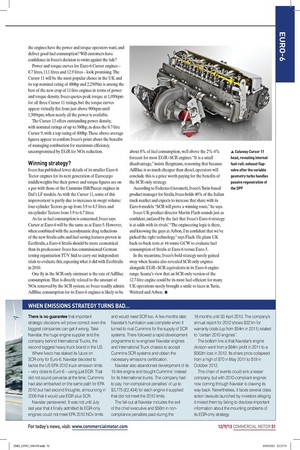WHEN EMISSIONS STRATEGY TURNS BAD...
Page 36

If you've noticed an error in this article please click here to report it so we can fix it.
There is no guarantee that important strategic decisions will prove correct: even the biggest companies can get it wrong. Take Navistar, the huge engine supplier and the company behind International Trucks, the second biggest heavy truck brand in the US.
Where Iveco has staked its future on SCR-only for Euro-6, Navistar decided to tackle the US EPA 2010 truck emission limits — very close to Euro-6 — using just EGR. That did not sound perverse at the time: Cummins had also embarked on the same path for EPA 2010 but had second thoughts, announcing in 2008 that it would use EGR plus SCR. Navistar persevered. It was not until July last year that it finally admitted its EGR-only engines could not meet EPA 2010 NOx limits
and would need SCR too. A few months later, Navistar's humiliation was complete when it turned to rival Cummins for the supply of SCR systems. There followed a rapid development programme to re-engineer Navistar engines and International Truck chassis to accept Cummins SCR systems and obtain the necessary emissions certification.
Navistar also abandoned development of its 15-litre engine and bought Cummins' instead for its International trucks. The company had to pay 'non-compliance penalties' of up to $3,775 (£2,434) for each engine it supplied that did not meet the 2010 limits. The fall-out at Navistar includes the exit of the chief executive and $56m in noncompliance penalties paid during the
18 months until 30 April 2013. The company's annual report for 2012 shows $321m for warranty costs (up from $54m in 2011) related to "certain 2010 engines".
The bottom line is that Navistar's engine division went from a $84m profit in 2011 to a $562m loss in 2012. Its share price collapsed from a high of $70 in May 2011 to $19 in October 2012.
This chain of events could sink a lesser company, but with 2010-compliant engines now coming through Navistar is clawing its way back. Nevertheless, it faces several class action lawsuits launched by investors alleging it misled them by failing to disclose important information about the mounting problems of its EGR-only strategy.









































